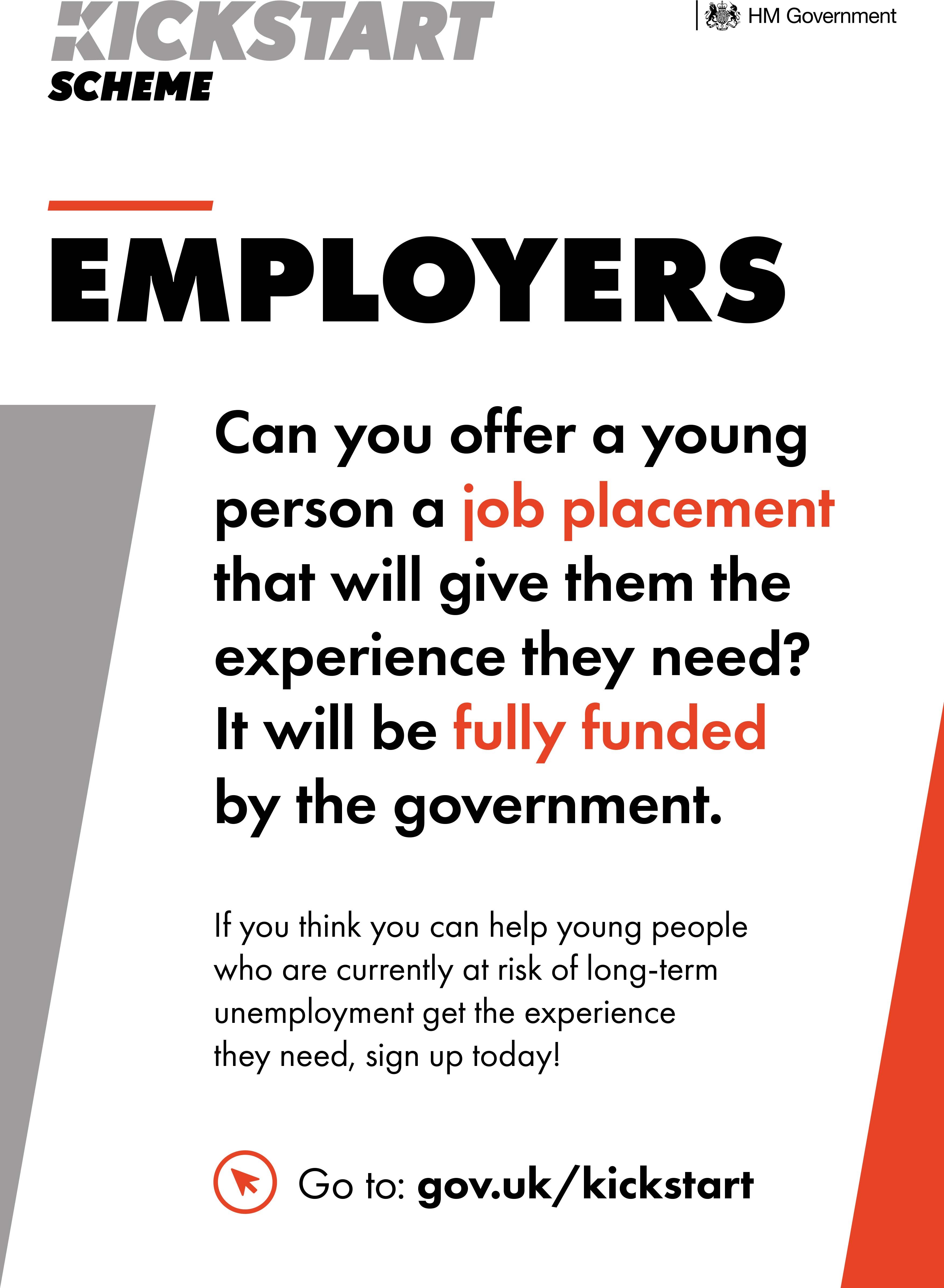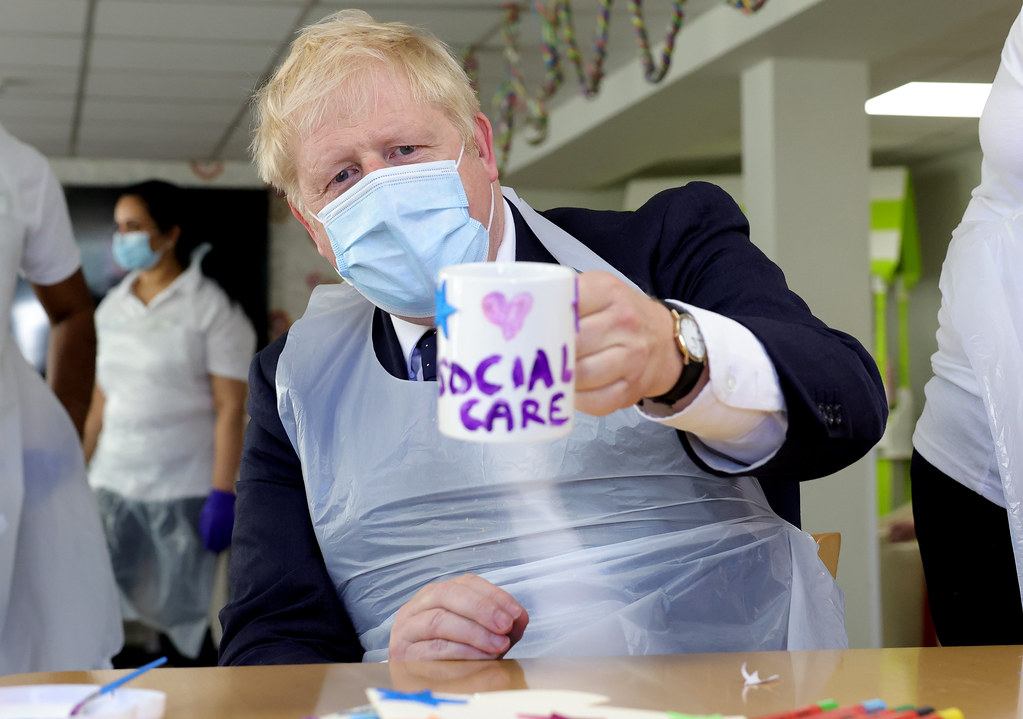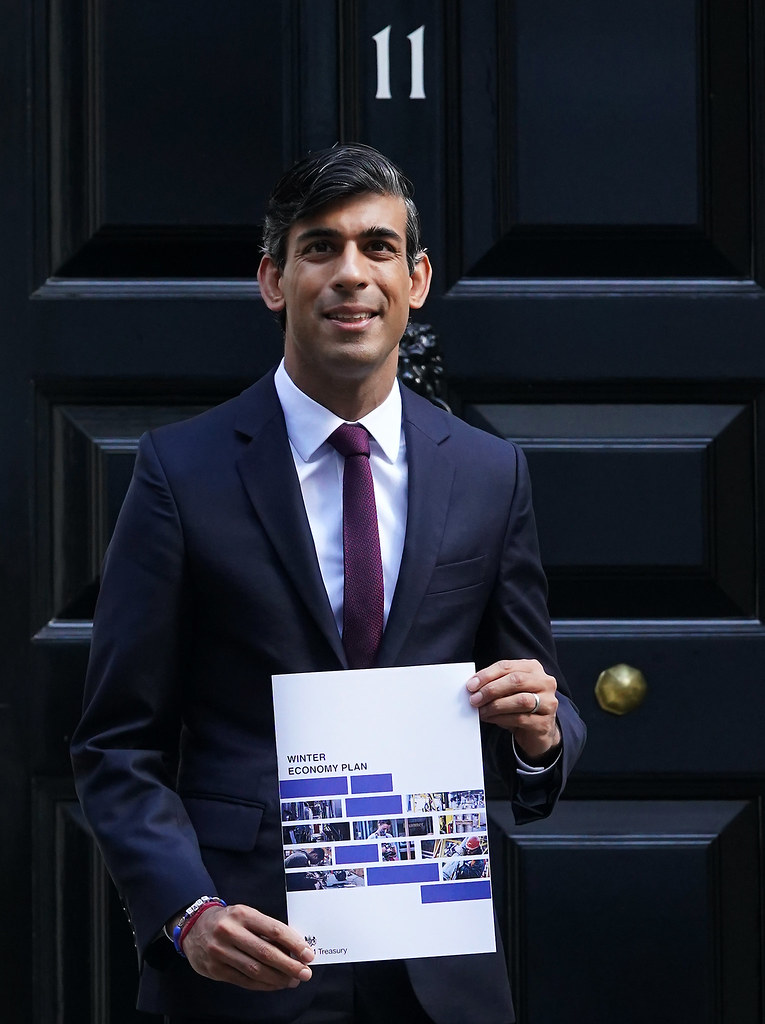
Chancellor of the Exchequer Rishi Sunak made the keynote speech at the Conservative Party conference in Manchester yesterday. On the week the Tories will cut the £20 Universal Credit lifeline, the Chancellor told the conference:
Whatever it takes.
That phrase, and those press conferences, were my introduction to so many of you as Chancellor.
It was daunting to face such a challenge in my first days in office. And what it also meant is that more than a year has gone by before I had the chance to meet you all properly. And that is why these last few days have been such a joy. Meeting you all face to face and hearing so many of you say to me “Wow, you’re even shorter in real life!”
Nothing can ever prepare you to become Chancellor, especially in recent times. There have been occasions where it really did feel that the world was collapsing. In those moments, there are certain things I fell back on. Yes, my family. Yes, my colleagues. Yes, my tremendous Treasury team.
And yes, the person who made all this possible, the person who delivered a thumping Conservative majority, my friend, our leader, the country’s Prime Minister, Boris Johnson.
But the other thing I fell back on is something we all have in this room. Our values. Our Conservative values.
I believe in some straightforward things.
I believe that mindless ideology is dangerous. I’m a pragmatist. I care about what works, not about the purity of any dogma. I believe in fiscal responsibility. Just borrowing more money and stacking up bills for future generations to pay, is not just economically irresponsible. It’s immoral.
Because it’s not the state’s money. It’s your money.
I believe that the only sustainable route out of poverty comes from having a good job. It’s not just the pounds it puts in your pockets. It’s the sense of worth and self-confidence it gives you. So I will do whatever I can to protect people’s livelihoods, and create new opportunities too.
And when it comes to those new opportunities, I am very much a child of my time. I spent the formative years of my career working around technology companies in California. And I believe the world is at the beginning of a new age of technological progress which can transform jobs, wealth, and transformed lives.
So: pragmatism. Fiscal responsibility. A belief in work. And an unshakeable optimism about the future. This is who I am. This is what I stand for. This is what it will take. And we will do whatever it takes.
Our Plan is Working
And there can be no prosperous future unless it is built on the foundation of strong public finances.
And I have to be blunt with you. Our recovery comes with a cost.
Our national debt is almost 100% of GDP – so we need to fix our public finances. Because strong public finances don’t happen by accident. They are a deliberate choice. They are a legacy for future generations. And a safeguard against future threats.
I’m grateful, and we should all be grateful to my predecessors and their 10 years of sound Conservative management of our economy. They believed in fiscal responsibility. I believe in fiscal responsibility. And everyone in this hall does too.
And whilst I know tax rises are unpopular. Some will even say un-Conservative. I’ll tell you what IS un-Conservative.
Unfunded pledges.
Reckless borrowing.
And soaring debt.
Anyone who tells you that you can borrow more today, and tomorrow will simply sort itself out just doesn’t care about the future.
Yes, I want tax cuts. But in order to do that, our public finances must be put back on a sustainable footing.
Labour’s track record on the public finances speaks for itself.
Since 2010, we’ve had 5 Labour Leaders, 7 Shadow Chancellors and innumerable spending pledges. And in all that time they still haven’t got the message. The British people won’t trust a Party that isn’t serious with their money. That’s why they vote Conservative.
We must never forget that the fundamental economic differences between us and Labour run very deep.
Differences not just about debt and borrowing but about how to deal with the real pressures people face in their lives.
And right now, we are facing challenges to supply chains not just here but right around the world and we are determined to tackle them head on.
But tackling the cost of living isn’t just a political sound bite. It’s one of the central missions of this Conservative government.
Picture this: you’re a young family. You work hard, saving a bit each month. But it’s tough.
You have ambitions for your careers for your children.
You want to give them the best more than you had.
Now you tell me: Is the answer to their hopes and dreams, just to increase their benefits?
Is the answer to tell that young family the economic system is rigged against you, and the only way you stand a chance is to lean ever more on the state?
Be in no doubt, that is the essence of the Labour answer.
Not only does Labour’s approach not work in practice. It is a desperately sad vision for our future.
But there is an alternative. An approach focused on good work, better skills, and higher wages.
An approach that says: ‘Yes, we believe in you. We will help you. And you will succeed.”
And better still, it’s more than words. It’s a plan in action. A Conservative plan and Conference it is working.
We’re giving people the means and opportunities to help themselves
Governments rarely get to set the tests by which they will ultimately be judged.
And our test is jobs.
Remember, as economies around the world pulled the shutters down, forecasters were predicting unemployment to reach 12%. Millions of people were on the precipice of losing their jobs, their livelihoods, and their homes.
Well, the forecasts were wrong.
The unemployment rate is at less than 5% and falling. That’s lower than France, America, Canada, Italy, and Spain.
And we now have one of the fastest recoveries of any major economy in the world.
Now it wasn’t that the forecasters had bad models No. It’s just their models did not take account of one thing – and that was this Conservative Government. Our will to act and our plan to deliver.
An increased national living wage. The restart programme. Sector based work academies. Doubling work coaches. Job finding support. Traineeships. Apprenticeship incentives. Skills Bootcamps. And the Prime Minister’s Lifetime Skills Guarantee.
All things we are doing that won’t just help people but will give them the means and opportunities to help themselves.
Our plan for the future
I believe in good work, better skills, and higher wages.
I believe that every person in this country has the potential to become something greater.
And I know that we, and only we, the Conservative party, are the ones who can make that happen.
And our economy cannot be what we need it to be without the courage, creativity and sheer force of will that each new generation brings.
Yet, at its peak just under 1 in 3 workers under 25 were on furlough. One in three.
That’s one million people who didn’t have the fall back of a career history or a network of contacts, and in many cases hadn’t even moved into their first job.
And so what did we do? We created the Kickstart scheme, up running and working in a matter of months. A landmark programme that is helping young people start exciting new careers.
And thanks to our plan, young people, just like John Chihoro who introduced me today, are starting those new jobs in their thousands.
So to give more young people the same chance as John, I can confirm we are expanding our successful Plan for Jobs into next year.
The Kickstart scheme extra support through the Youth Offer, the Job Entry Targeted Support scheme, and our Apprenticeship Incentives. All extended because we believe in the awesome power of opportunity.
And we are going to make sure that no young person in our country is left without it.
But what we do today means little if we don’t also have a plan for tomorrow.
A plan for the future.
A future economy shaped by the forces of science, technology, and imagination.
The years I spent in California left a lasting mark on me, working with some of the most innovative and exciting people in finance and technology. Watching ideas becoming a reality. Seeing entrepreneurs build new teams.
It’s not just about money.
I saw a culture, a mindset which was unafraid to challenge itself, reward hard work, and was open to all those with the talent to achieve.
The future is here
I look across the United Kingdom and that culture is here too in the young people I’ve already spoken about today, unencumbered by timidity and orthodoxy.
And it’s there in our willingness to take risks not just on companies, but on people.
People with the raw potential to create a wave of the most dynamic high growth companies. A wave that will reach the farthest corners of the world.
That optimism, that unshakeable belief that the future, can be different and better was also at the heart of Brexit.
I remember over five years ago being told that if I backed Brexit my political career would be over before it had even begun.
Well, I put my principles first. And I always will.
I was proud to back Brexit. Proud to back Leave.
And that’s because despite the challenges in the long term, I believed the agility flexibility and freedom provided by Brexit would be more valuable in a 21st century global economy than just proximity to a market.
That in the long term a renewed culture of enterprise willingness to take risks and be imaginative would inspire changes in the way we do things at home.
Brexit was never just about the things we couldn’t do. It was also about the things we didn’t do.
That’s why we introduced the super deduction, a UK first in tax policy which is triggering an explosion in capital investment.
That’s why we created the Help to Grow scheme another UK first to help small and medium sized companies digitize skill up and scale up.
That’s why we launched the Future Fund another UK first in government investment backing high potential start-ups.
My point is this: even if you can’t see it yet, I assure you, the future is here.
Now is the time to turn to the future
Last year alone the UK attracted more venture capital investment to our startups than France and Germany combined.
And along with enhanced infrastructure and improved skills, we are going to make this country not just a Science Superpower, not just the best place in the world to do business… I believe we’re going to make the United Kingdom the most exciting place on the planet.
Take Artificial Intelligence. Once the stuff of science fiction. Now it’s reality – and we’re a global leader.
The steam engine kicked off the industrial revolution. Computers delivered automation. The internet brought information exchange.
And as the latest general-purpose technology, AI has the potential to transform whole economies and societies.
If Artificial Intelligence were to contribute just the average productivity increase of those three technologies, that would be worth around £200 billion a year to our economy.
And so today, I am announcing that we will create 2,000 elite AI scholarships for disadvantaged young people and double the number of Turing AI World-Leading Research Fellows, helping to ensure that the most exciting industries and opportunities are open to all parts of our society.
New policy, focused on innovative technology, supporting jobs for the next generation, a sign of our ambition for the future.
Because that’s why we are here. All of us. That’s why we became members of the Conservative party.
That’s why you all give up so much of your time sacrificing things that are important to you in order to help build a better future.
You know, the longer I spend in this job, the more I realise that the worst parts of politics are driven by fear. Fear of change. Fear of losing. The fear of being wrong. Even fear of the future.
And when people get scared they create divisions. They say: “you’re either with us or you’re with them.” But you cannot make progress if you’re pitting people against each other.
That’s what you get from a tired, fearful sort of politics. We saw it last week in Brighton.
It’s not just that Labour don’t like us. They don’t even like each other.
Whereas we, the Conservatives, are now and always will be the party of business and the party of the worker.
The party of the private sector and the public sector.
A party for the old and the young.
The British people want a party that can get things done.
So, at just the moment when it feels like we’ve done enough, that we’ve gotten through, that we can take a rest, we must not stop.
Now is the time to show them that our plan will deliver.
And now is the time, at last, at long last, to finally turn to the future.
Thank you.

Responding to the Chancellor’s speech at Conservative Party Conference, Helen Barnard, Deputy Director of the Joseph Rowntree Foundation, said: “The Chancellor may say he has a plan for jobs but he has no plan for paying the bills.
“He spoke of doing whatever it takes to protect people’s livelihoods, yet he is cutting the incomes of around 5.5 million families by £1,040 a year on Wednesday when we are facing a cost of living crisis.
“It is completely wrong to suggest there is a trade-off between good jobs and adequate social security when they are both essential to improving people’s living standards.”

“This cut will impact many working families and inadequate social security makes it harder for people to seize opportunities whilst they struggle to stay afloat. We must ensure people who are sick, disabled or caring for others and therefore unable to work can meet their needs with dignity.
“To impose the biggest ever overnight cut to social security would be economically irresponsible which is why it is so fiercely opposed from across the political spectrum. The Government can’t credibly claim to be levelling up while levelling down people’s incomes. He must abandon this cut.”
























